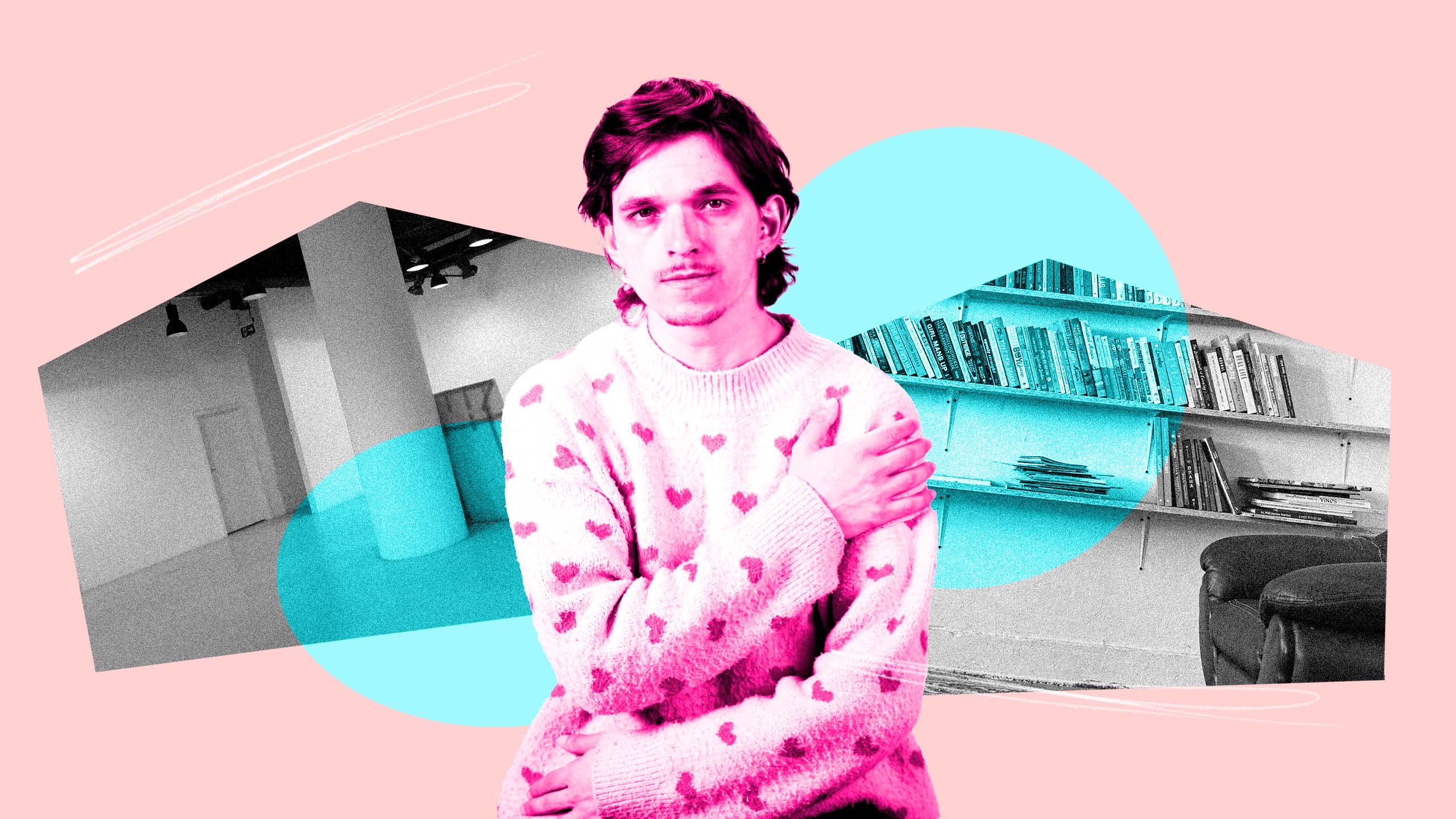When Iryna escaped her home in Zaporizhzhia in southeastern Ukraine in March, she made it to Poland and needed a safe place to stay. As a bi woman, she wasn’t sure whom to trust in a country with homophobic attitudes and policies like LGBT-free zones. Through a lesbian friend who also left Ukraine, Iryna (who did not want her last name used for this story) was introduced to Filip Kijowski, an artist who is part of a queer Polish network helping queer Ukrainian refugees.
“I was calmer with those people who will not judge me because of my orientation,” Iryna tells Xtra. “Filip and his friends helped me a lot when I needed it.”
Iryna is just one of the people whom Kijowski and his collaborators has helped to find refuge beyond the borders of Ukraine. With the help of international donors, Kijowski is using art, social media, books and backpacks full of hormones to help queer and trans Ukrainian refugees find welcome in a region where anti-LGBTQ+ attitudes are common.
“The city’s proximity to the border has been useful for the small network of volunteers helping LGBTQ+ refugees escape the Russian attacks.”
When Kijowski, 27, moved to Lublin, Poland, from London in 2020 for a one-year residency with Galeria Labirynt, he never would have considered that the city’s particular geographic position, about a two-hour drive from the Ukrainian border, would one day be important. Now, through his extended relationship with the gallery, the city’s proximity to the border has been useful for him and a small network of volunteers who are helping LGBTQ+ refugees escape the Russian attacks on Ukraine.
This week Kijowski will turn one of the large exhibit rooms at Galeria Labirynt into an ongoing drop-in centre that queer and trans Ukrainian refugees can visit to have coffee or tea, socialize, rest or use a laptop to work or access email or resources on free WiFi. There will also be a team on hand to provide support to the refugees. The gallery considers the support centre to be an art exhibit, an extension of Kijowski’s Biblioteka Azyl project, which uses books as an act of resistance.
Using GoFundMe to fundraise internationally, Biblioteka Azyl (Asylum Library) will offer warm food, clothing, first aid items and hygiene products to those who visit. While the gallery space is aimed at making LGBTQ+ refugees feel welcome and connected, Kijowski has even loftier goals to help Ukrainians settle into new homes, if only temporarily. The bulk of the money raised will be spent on renting accommodations in Lublin, a city of about 350,000 people, where refugees can stay for up to two months.
Kijowski, a dance artist and choreographer who was raised in the UK by Polish parents before moving to Poland, is part of an informal network of LGBTQ+ people and organizations who field requests for help that come in via Whatsapp, Instagram and Facebook. The refugees hear about the contacts via word of mouth—queer friends telling other queer friends whom to trust. The Polish helpers assist in finding LGBTQ+-friendly temporary housing, not just in Lublin, but in Warsaw, Berlin or even Canada, where Iryna eventually ended up after her stay in Poland. Kijowski continued messaging with her and helped connect her with a safe place to stay in Toronto before Iryna went on to her final destination elsewhere in Canada.
“It’s almost like a personalized experience, as if we want to make sure we are with them every stop of the way.”
The volunteers also arrange transportation from the Ukraine border, help refugees find work, translate documents, transport supplies by car or whatever else is needed. “It’s almost like a personalized experience, as if we want to make sure we are with them every stop of the way, even if I’m not physically there,” Kijowski says. He’s currently staying in Berlin and is providing assistance through social media messaging. “A lot of the work is responding to immediate needs.”
Beyond essentials like finding housing, transportation and workplaces where the refugees will be welcomed and safe, the GoFundMe project also takes into account the specific needs of LGBTQ+ people, including hormones for trans people. “I actually went and met a person today with a bag of hormones in my backpack and those will be handed off to the next person,” Kijowski says.
The effort has helped about 30 people so far, most in their early twenties. Some are trans, while the majority are queer women; most men are not allowed to leave Ukraine because they are obliged to do military service.
This isn’t Kijowski’s first foray into activist art. The refugee support centre is the next evolution of his Biblioteka Azyl exhibit, created in 2020 and housed at Labirynt. A collection of over 800 LGBTQ+ books donated by authors and publishers from around the world, Kijowski launched the project in response to a 2019 statement from Poland’s ruling party leader, Jaroslaw Kaczynski, calling LGBTQ+ people and their rights and movement “an attack on the family and children” and “a threat to Polish identity, to our nation, to its existence and thus to the Polish state.” Over the last few years, many Polish municipalities have declared themselves “LGBT-free zones”—areas unwelcoming to queer and trans people. Since education about queerness is almost nonexistent in Polish public schools, Kijowski created a “refuge” where people could come to learn.
“The response I received was overwhelming, and just so kind and kind of astonishing.”
Since March 2021, he’s sent out over 300 messages to authors and publishers of books with LGBTQ+ characters and content, and almost all of them agreed to mail free copies of their books to Lublin. He was moved by the community’s replies: “The response I received was overwhelming, and just so kind and kind of astonishing.”
That kind of response came not just from the international community, but from within Poland, too. Kijowski stresses that Poland is more than its homophobic reputation. “Of course it’s homophobic,” he says, “but at the same time, there are so many people, and NGOs who have been working for 25 years. I feel like just mentioning this negativity and just mentioning these LGBT-free zones and the hardships that are happening just takes away the credit of all the beautiful and everyday-changing work that is happening on the ground.”
Usually, Kijowski’s freelance art projects end after a limited time, but the drop-in centre doesn’t have a closing date. He’s not sure how it will evolve and is open to seeing how it will change as needed. He doesn’t want to dismantle the library, either.
“I’m invested in bringing queer predicaments into the narratives of my work. My artistic practice focuses on community, togetherness and improvisation,” Kijoswki says. The process of “searching, getting lost and in between” is what keeps him engaged in his art day after day.
“I feel as if we have this word, the chosen family, in the queer community,” Kijowski says. “I think the biggest factor in it is safety … and knowing that there’s going to be this extended family waiting for you there.”


 Why you can trust Xtra
Why you can trust Xtra


